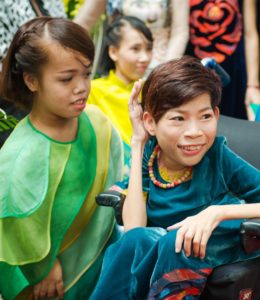
The UN International Day of People with Disability has special meaning for a group of Vietnamese women who are taking to the catwalk as part of a Flinders Australia Award Fellowship program.
The bright lights of the fashion world of modeling might seem unattainable to most women, but the experience is now shared by a group of women with disabilities in Vietnam.
Some in wheelchairs and using mobility aids, the “I am beautiful. You too!” parades are being organised by Flinders University Australian Award Fellowship program graduate Nguyen Thi Van (pictured).
“No matter who you are, man or woman, rich or poor, with or without disabilities, everyone is born equal in dignity and rights and has the right to be treated with respect and to promote their own values,” says Ms Nguyen, better known as Van Theresa, the founder of Vietnamese social enterprise venture, The Will to Live Centre, in Hanoi.
“Providing people with disabilities with the chance to feel attractive and to shine on a catwalk is key to give them more confidence to live a life of dignity in an inclusive society,” she says.
The initiative was conceived last year during Van Theresa’s three-month intensive fellowship at Flinders University in South Australia. The University’s Gender Consortium has hosted Australia Awards Fellowship programs for almost a decade, with support from the Australian Government’s Department of Foreign Affairs and Trade (DFAT).
Australia Awards Fellowships offer short-term study and professional development with Australian organisations to leaders from developing countries.
Cara Ellickson, the director of Flinders’ Gender Consortium in Flinders’ School of History and International Relations, said Van Theresa’s Vietnamese project commenced with a parade in Hanoi last month. Others are planned for two other cities in Vietnam to mark the International Day of People with Disability, which is celebrated on 3 December.
The events also fit with Vietnam’s ratification of the United Nations Convention on the Rights of Persons with Disabilities, which confirms the country’s political commitment to promoting and protecting the rights of the disabled.
“The parades for disabled Vietnamese woman are a stepping stone to change the stereotypical idea of beauty and promote a new perception of beauty stemming from diversity and difference,” Ms Ellickson says.
“The 30 models were also given an opportunity to join a follow-up empowerment retreat to formalize a support and advocacy network for themselves and other Vietnamese women with disabilities to address significant disability and gender discrimination issues.”
The fashion parades are supported by the UN in Vietnam, Australia Aid and the Italian embassy, along with Ms Ellickson and colleagues, and international fashion brands Chula from Spain, Bianco Levrin from Italy and the Ideas Design by Ngoc Han. Local makeup, hairdressers and many other individuals supported the parades.
The Australian Ambassador to Vietnam, Mr Hugh Borrowman, says: “Disability-inclusive development is good development practice and contributes to poverty reduction, economic growth and better development outcomes for all.”
This year’s Australian Awards Fellowships at Flinders has supported a group of 18 business woman from a range of industries, government and non-government organisations in Mongolia and Indonesia.
Ms Ellickson said the experience of working with Vietnam and other countries in South East Asia and the Pacific informs the topics taught by Gender Consortium staff in the Graduate Certificate in Gender Mainstreaming and Policy Development, Development Studies and Women’s Studies.
The Gender Consortium is currently implementing a DFAT Government Partnerships for Funding Development program in Vietnam to combat gender-based violence and trafficking.

